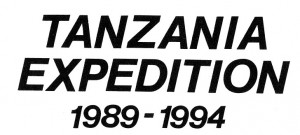Operating from a small office on the top floor of London’s Fruit and Wool Exchange in the East End and managed by only two persons is the Frontier Tanzania/Society for Environmental Exploration Project which is sending hundreds of British young people to work on environmentally related work in Tanzania.
The project began in July 1989 and already more than a hundred young Britons have been to Tanzania under the project. They claim to have put in 10,000 man days of work so far – equivalent to one person’s effort over a per! od of fort y years. It is hoped to send some 200 young British people to Tanzania each year for the next four years.
Guiding and supporting the young volunteers (average age 22) have been some twenty Tanzanian specialists (including post-graduate students) and twenty five experts from overseas institutions including the world famous author of the book ‘Mammmals of East Africa’ , Jonathan Kingdon.
‘Frontier’ is a collaborative project between the University of Dar es Salaam and the UK based Society for Environmental Exploration(SEE). A Memorandum of Understanding was signed between the two parties on July 12th 1989.
The objectives are defined as to promote and advance field research into environmental issues, implement practical projects designed to maintain or improve the environment and promote the sustainable exploit at ion of natural resources. SEE is a charitable organisation funded only by the contributions of the participating research scientists and the young people themselves who are research assistants.
Work accomplished between July and the end of last year has been in four areas – coastal forest studies, marine research on Mafia island, research on mangroves in the Rufiji Delta and various studies in the Mikumi National Park.
In the Park, work has been organised by the University of Dar es Salaam’s Botany Department and has included vegetation mapping and the establishment of forest plots – a wide diversity of forest types were found where only one was thought to exist. At the invitation of the National Park authorities, Frontier has conducted studies on the construction of roads in the southern part of the Park; the routes for 58 kms of new roads were defined.
Among the more important aspects of the work has been the assessment of the damage being suffered in the coastal forests at Kiono, Kisiju, Pugu Hills, the Vikindu Forest Reserve and in the Matumbi H:llls, The areas of remaining forest have been documented along with the destruction being brought about by logging, charcoal burning and slash-and-burn subsistence farming and hence the projected life spans of each forest. Preliminary results indicate that known evergreen coastal forests probably now occupy less than 200 sq kms and that a mere 50 sq kms remains completely undamaged. Frontier insists however that it is not a campaigning organisation. It leaves to others the dissemination of the information it helps to collect and the implementation of appropriate remedial action.
Frontier has provided transport, accommodation in tented camps and field equipment in the forests to help Tanzanian scientists in such work as mist netting of bird species, assembling quantitative data on the floristic composition of the forests, the collection of over 3,000 herbarium specimens (one new species of flowering plant was discovered), studies related to a new theory on shell polymorphism of selected snail species and the discovery of a species of toad new to science.
The Rufiji Delta contains the largest area of estuarine mangrove forest in East Africa <1,022 sq kms) and Dar es Salaam University's Botany Department selected the site for Frontier's research work on a small island in the Delta Simba Uranga. Studies there include recording patterns of mangrove sedimentation and shoreline retreat, vegetation mapping, determining patterns of water and sediment flux within the main channels, measurements of salinity intrusion, prawn fishing activities and the distribution of wintering bird populations. Asked in her London office to which she had just returned from Tanzania what had been the main problems so far, Eibleis Fanning, one of the organisers, mentioned three things. Firstly, some medical problems in the field in Tanzania - one case of malaria and lots of cuts and bruises amongst the volunteers. Secondly, a shortage of funds to employ additional staff in London, And, thirdly, the urgent need for a photocopier and a computer or word processor. Any reader of the Bulletin upgrading his Amstrad for something better and not knowing what to do with the old model is requested to phone Frontier at 01 375 2390! David Brewin

